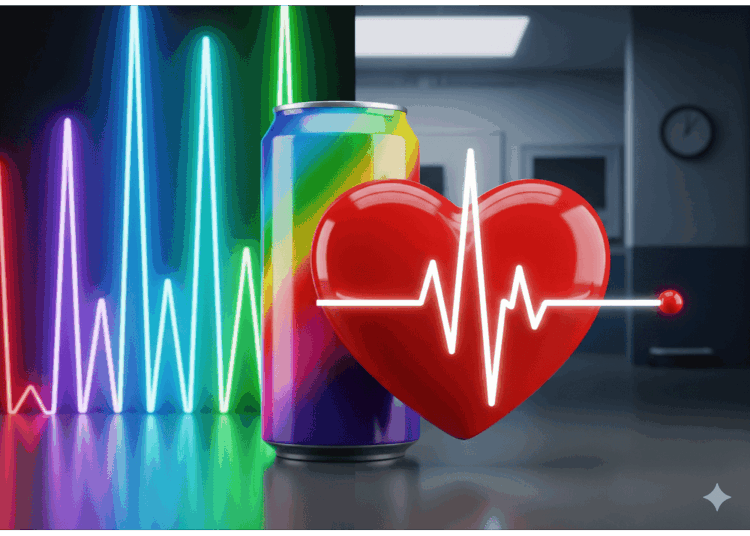How Do Energy Drinks Affect Your Heart and Health?
In today’s fast-paced world, energy drinks have become a go-to solution for people seeking a quick boost of energy, focus, or alertness. Whether it’s students preparing for exams, athletes looking for endurance, or professionals powering through deadlines, energy drinks are marketed as an instant fix.
But while these beverages may provide a temporary surge in energy, research increasingly shows they can negatively impact both your heart and overall health. From caffeine overload to hidden stimulants and excess sugar, the risks are worth understanding—especially if you have heart issues, high blood pressure, or other underlying health conditions.
The Impact of Energy Drinks on Your Heart
Energy drinks influence the heart in several critical ways. The Centers for Disease Control and Prevention (CDC) notes that the combination of caffeine and stimulants in these beverages can raise heart rate and blood pressure, two well-known risk factors for heart disease.
The National Institutes of Health (NIH) further highlights that excessive consumption may trigger irregular heart rhythms (arrhythmias) and other cardiovascular issues. This is because high caffeine levels affect how heart cells transmit electrical signals, essentially forcing your heart to “sprint without a warm-up.”
For individuals with existing heart conditions, these effects can be especially dangerous. Even healthy adults may feel jittery, anxious, or notice palpitations after consuming large amounts.
Key Ingredients in Energy Drinks That Affect Your Heart
Energy drinks contain a blend of ingredients designed to stimulate energy, but some carry significant health risks. Here are the most common to watch for:
1. Caffeine
The primary stimulant in energy drinks, caffeine increases alertness but in high doses can lead to:
-
Heart palpitations
-
Elevated blood pressure
-
Irregular heart rhythms
Many energy drinks contain far more caffeine than a standard cup of coffee, sometimes without clearly labeling total content.
2. Taurine
Often marketed as enhancing performance, taurine combined with caffeine may intensify stimulant effects, raising heart rate and blood pressure even further.
3. Guarana
Guarana is a natural source of caffeine, sometimes added without clear labeling. This means your actual caffeine intake could be much higher than expected.
4. Ginseng
A popular herbal additive, ginseng is generally safe but lacks comprehensive research. It may interact with certain medications, which could complicate cardiovascular health.
5. Sugar
Many energy drinks contain high amounts of sugar, which:
-
Contributes to obesity (a heart disease risk factor)
-
Causes rapid spikes and drops in blood sugar
-
Adds unnecessary calories that impact long-term health
6. B Vitamins
While essential in small amounts, energy drinks often pack mega-doses of B vitamins. Excessive intake can stress the liver and kidneys, especially in those with pre-existing conditions.
7. Artificial Sweeteners
Marketed as a “healthier” alternative to sugar, some artificial sweeteners are linked to heart-related risks, making them less than ideal substitutes.
Tips for Safer Energy Drink Use
If you do choose to consume energy drinks, there are several ways to minimize risks and protect your heart:
-
Know the Ingredients: Always check the label for caffeine content, added stimulants, and sugar levels. Some ingredients may not be clearly listed.
-
Seek Natural Alternatives: Instead of energy drinks, consider healthier ways to boost energy, such as better sleep, staying hydrated, eating nutrient-rich foods, and regular exercise.
-
Pay Attention to Your Body: If you experience symptoms like jitteriness, anxiety, or rapid heartbeat after consuming energy drinks, it’s a red flag to stop.
-
Consult Your Doctor: If you have high blood pressure, heart problems, or take medications, always check with your healthcare provider before consuming energy drinks.
Healthier Ways to Boost Energy Without Risks
Energy drinks aren’t the only option when you need an energy lift. Safer alternatives include:
-
Adequate sleep: Rest remains the most natural and effective energy booster.
-
Balanced nutrition: Whole grains, lean proteins, fruits, and vegetables provide steady energy.
-
Hydration: Dehydration often masquerades as fatigue. Drinking enough water can naturally restore alertness.
-
Movement breaks: Light exercise or stretching can stimulate blood flow and mental clarity.
Conclusion: Protecting Your Heart from Energy Drink Risks
Energy drinks may promise quick relief from fatigue, but the potential costs to heart health and overall well-being should not be overlooked. Ingredients like caffeine, taurine, guarana, sugar, and even excess vitamins can contribute to increased blood pressure, irregular heartbeats, and long-term cardiovascular problems.
The safest way forward? Choose healthier lifestyle changes to improve energy while keeping your heart strong. Remember, making informed decisions today helps protect your heart for the future. For more guidance, consult trusted sources like the CDC and NIH.
For expert insights on how business, health, and innovation intersect, explore IMPAAKT – the top business magazine for leaders shaping the future.














